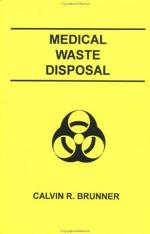|
This section contains 2,816 words (approx. 10 pages at 300 words per page) |

|
The garbage that is managed by local governments is known as municipal solid waste (MSW). Specifically, MSW is waste generated by commercial and household sources that is collected and either recycled, incinerated, or disposed of in MSW landfills. The U.S. Environmental Protection Agency (EPA) separates MSW into several categories, including containers and packaging, yard wastes, durable goods, and nondurable goods. Examples of durable goods, which are designed to last longer than three years, include appliances, tires, batteries, and electronic equipment. Newspapers, clothing, disposable tableware, office paper, wood pallets, and diapers, which all have a lifetime of less than three years, are types of nondurable goods. MSW does not include domestic sewage and other municipal wastewater treatment sludges, demolition and construction debris, agricultural and mining residues, combustion ash, and wastes from industrial processes. These types of waste, known collectively as industrial solid waste, are largely excluded...
|
This section contains 2,816 words (approx. 10 pages at 300 words per page) |

|


